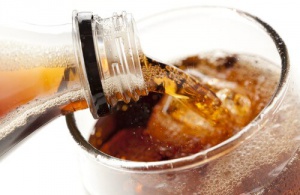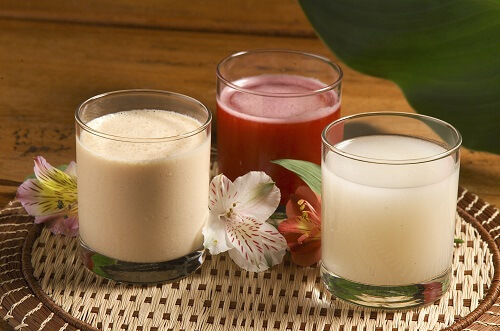Drinks that Cause the Most Weight Gain


Written and verified by the doctor Nelton Abdon Ramos Rojas
Just imagine how helpful it would be to eliminate the drinks that cause the most weight gain from your diet.
Even though a lot of people do indeed drink the recommended amount of water each day, only a small percentage of those people drink pure water. The excess sugar and calories from other unhealthy beverages affect both your figure and your health.
We often turn to flavored drinks, sugar-sweetened beverages, fruit juices, sweetened teas, alcoholic drinks, soda, and so many others. However, do we really know how and why these are the drinks that cause the most weight gain?
Drinks that Cause the Most Weight Gain
Alcoholic drinks
Alcohol and obesity go hand-in-hand for so many reasons.
There’s no doubt that alcoholic drinks are among the drinks that cause the most weight gain. First of all, they’re huge sources of calories that our liver has to work extremely hard at processing. Excessive alcohol consumption also damages this organ.While the liver is burning off alcohol, it can’t burn the other fats you’ve consumed.
In addition, alcohol frequently increases appetite, rather than satiating it.
Plus, it’s important to keep in mind that alcohol is considered a mild drug, as it creates addiction. If you want to take care of your health, limit your consumption as much as possible.
Read also:
How to Care for Your Liver
Soda and Refreshments
Sweetened beverages are also a key cause of obesity and one of the drinks that cause the most weight gain. Any soft drink contains added sugars, which normally come from the cheapest and lowest quality genetically modified corn syrup. They also receive a noticeable glucose injection in order to create addiction, causing extremely elevated levels of sugar sweetener.
“Light” drinks also come with certain contraindications. After all, these are frequently sweetened with aspartame, which is extremely harmful to health.
Not only do they add harmful artificial sweeteners, but they also create excessive sodium in the body, which causes water retention. This does absolutely no good for your weight, and it also puts a lot of stress on your kidneys and liver if you drink it regularly.
Industrial Fruit juices
Industrial juices not only retain very little fruit, but are also made with flavor additives and unhealthy coloring agents. They can also contain low-quality added sugars. For all these reasons, it’s best to make your own juices at home using high-quality fresh fruits and vegetables.
There’s nothing healthier, tastier, or that provides more energy than a natural fruit juice. It’s even better if it is organic and hasn’t been treated with chemicals or industrial pesticides. If you decide to buy these types of juices, make sure they have the organic seal. Otherwise, opt to make them yourself at home.
The Healthiest Drinks
Overall, the best way to cure thirst is with pure water. It’s best to drink fresh mineral water, which is usually available for a reasonable price at stores and vending machines.
Read more about water:
The Benefits of Water Therapy: Why it Should Be a Part of Your Routine
In addition, the best flavored drinks for health are teas and herbal teas, freshly squeezed fruit and vegetable juices, and vegetable milk from oats, rice, or almonds, along with other roasted grains dissolved in water, like coffee or barley.
Try them instead of the unhealthy options. We know you’ll love them!
All cited sources were thoroughly reviewed by our team to ensure their quality, reliability, currency, and validity. The bibliography of this article was considered reliable and of academic or scientific accuracy.
- Malik VS, et al. “Sugar-sweetened beverages and weight gain in children and adults: a systematic review and meta-analysis”, Am J Clin Nutr. 2013 Oct;98(4):1084-102.
- Gill JM, Sattar N, “Fruit juice: just another sugary drink?”, Lancet Diabetes Endocrinol. 2014 Jun;2(6):444-6.
- Wang L, et al. “Alcohol consumption, weight gain, and risk of becoming overweight in middle-aged and older women.”, Arch Intern Med. 2010 Mar 8;170(5):453-61.
- A. Grandjean, Water Requirements, Impinging Factors, and Recommended Intakes“, Organización Mundial de la Salud, 2004
- Vartanian LR, Schwartz MB, Brownell KD. Effects of soft drink consumption on nutrition and health: A systematic review and meta-analysis. American Journal of Public Health. 2007.
- Giacaman RA, Pailahual V, Díaz-Garrido N. Cariogenicity induced by commercial carbonated beverages in an experimental biofilm-caries model. Eur J Dent. 2018;
- Rakova N, Kitada K, Lerchl K, Dahlmann A, Birukov A, Daub S, et al. Increased salt consumption induces body water conservation and decreases fluid intake. J Clin Invest. 2017;
- Traversy G, Chaput JP. Alcohol Consumption and Obesity: An Update. Current obesity reports. 2015.
This text is provided for informational purposes only and does not replace consultation with a professional. If in doubt, consult your specialist.










